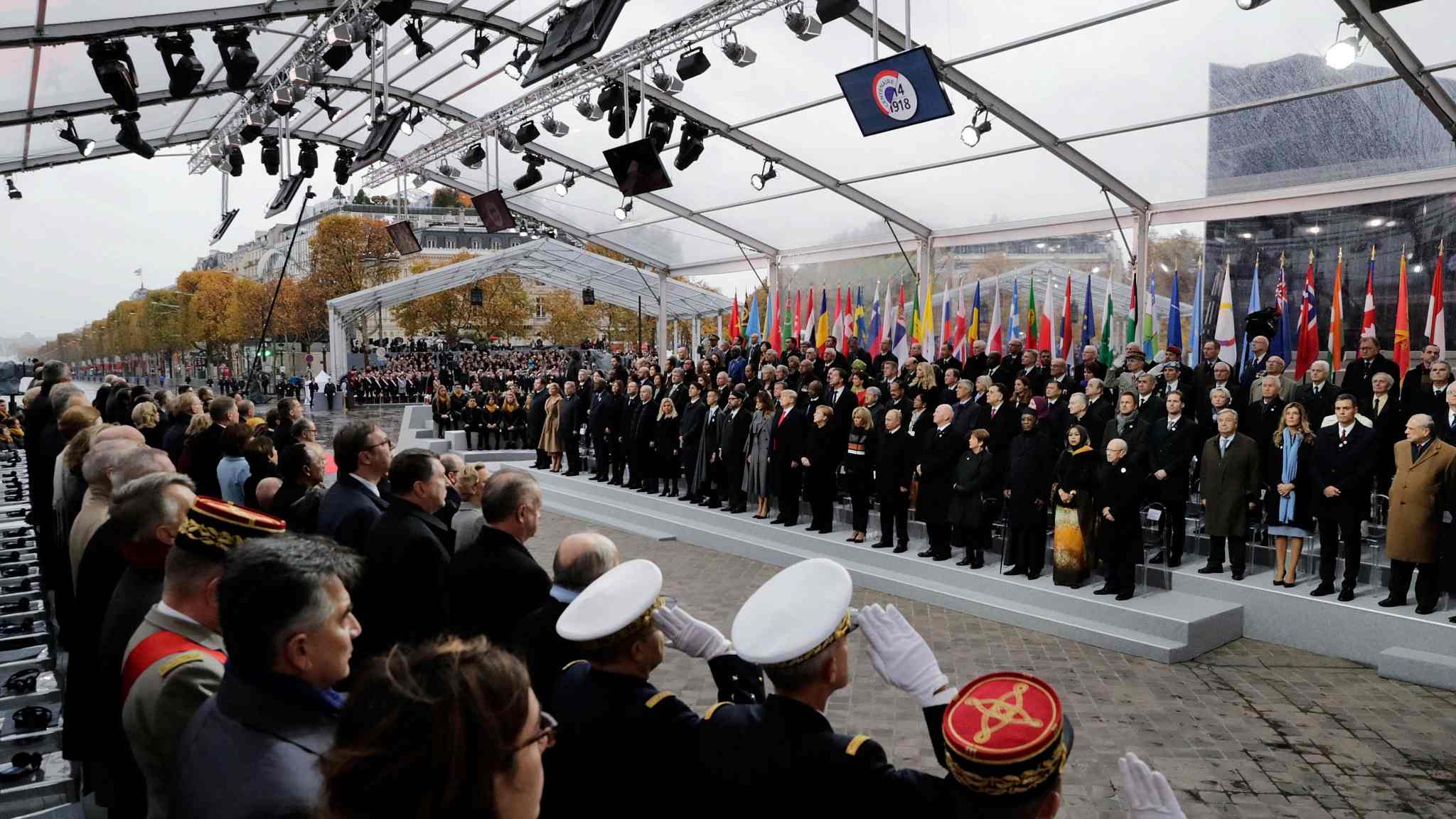The world celebrated the 100th anniversary of the end of World War One on Sunday with bells tolling across much of Europe and other allied nations at 11 a.m., the exact time when guns fell silent on November 11, 1918 after four years of savage fighting.
In Paris, some 70 world leaders -- including French President Emmanuel Macron, German Chancellor Angela Merkel, US President Donald Trump and Russian President Vladimir Putin -- gathered for a large-scale ceremony at the Arc de Triomphe.
Commemorations were also held in Australia, New Zealand and the UK, and at the sites of some of the bloodiest battles of the war, which claimed some 18 million lives and scarred Europe for decades.
'It was yesterday...'
In a speech at the Tomb of the Unknown Warrior in Paris, Macron made an impassioned plea for remembering the lessons of World War One, rejecting nationalism and working towards lasting peace.
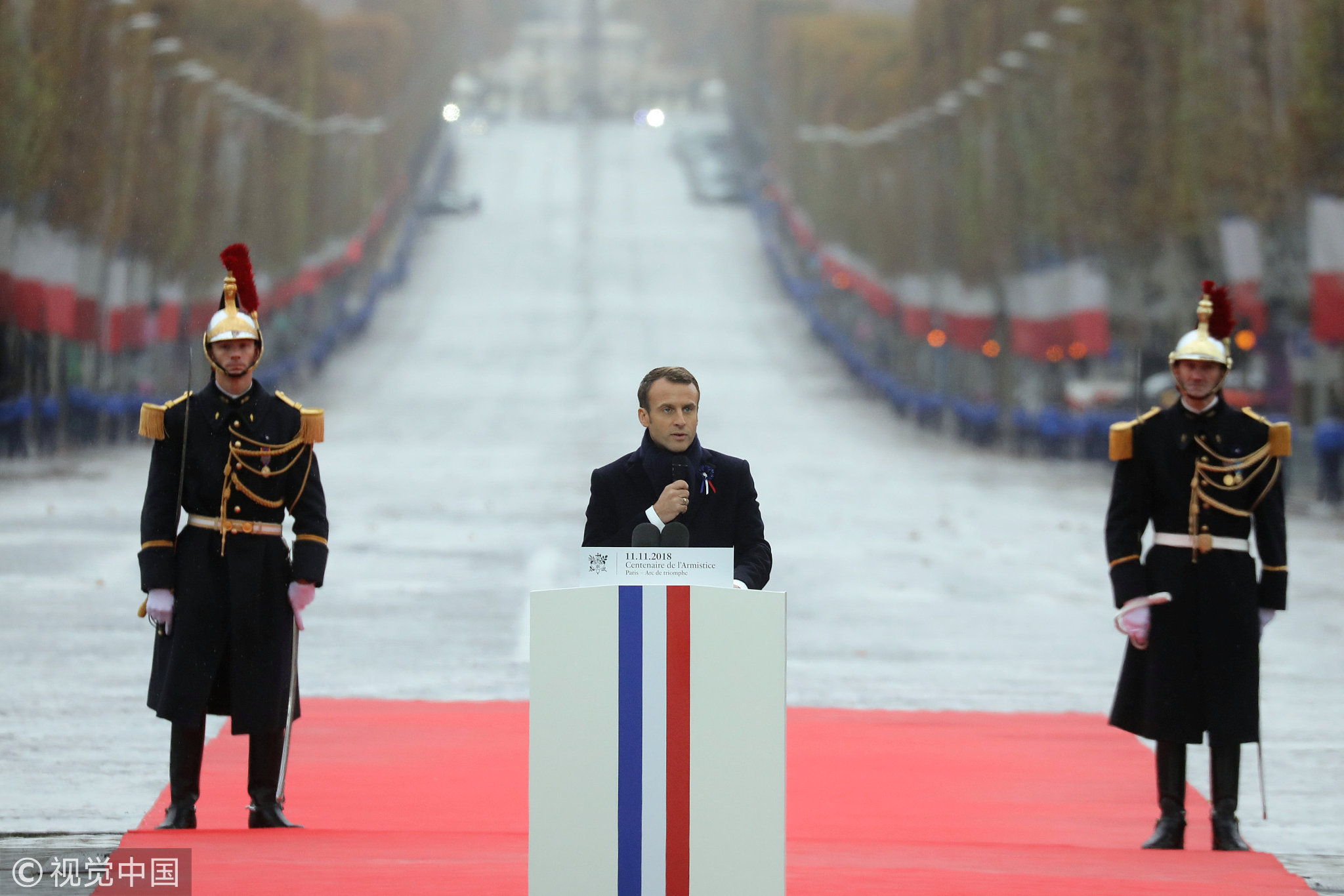
French President Emmanuel Macron delivers a speech during a ceremony commemorating the end of World War I at the Arc de Triomphe in Paris, France, November 11, 2018. /VCG Photo
French President Emmanuel Macron delivers a speech during a ceremony commemorating the end of World War I at the Arc de Triomphe in Paris, France, November 11, 2018. /VCG Photo
"It seems a long time ago, and yet it was yesterday," he warned.
"Let's remember, let's not forget," he went on, noting how the horrors of war came to be replaced by Franco-German reconciliation and international cooperation in the form of the European Union and United Nations.
"Peace must be above everything else because we know the price," he concluded.
The day of remembrance in Paris began when the bells of Notre Dame Cathedral rang out at 11 a.m.
Under streaming rain, world leaders made their way to the Arc de Triomphe where they heard performances by famed cellist Yo-Yo Ma, West African singer Angelique Kidjo and a European youth orchestra.
Eight high school students read out testimonies by French, British, US and German soldiers as well as a French civilian and a Chinese laborer, recalling their emotions at the end of the war, in a ceremony designed to highlight how multinational this first "world war" was.
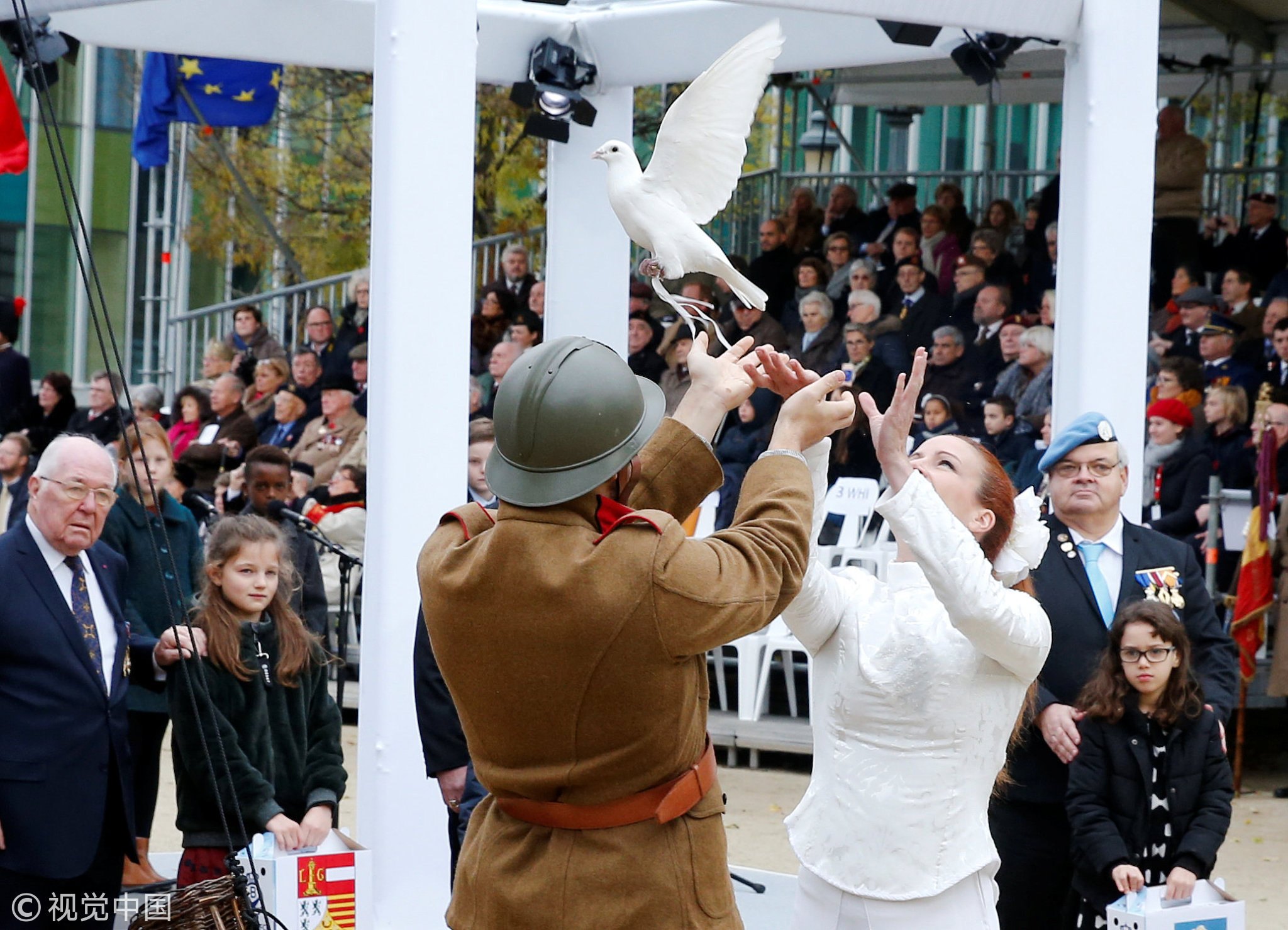
A dove is freed as a sign of peace during a ceremony at the Tomb of the Unknown Soldier in Brussels, Belgium, November 11, 2018. /VCG Photo
A dove is freed as a sign of peace during a ceremony at the Tomb of the Unknown Soldier in Brussels, Belgium, November 11, 2018. /VCG Photo
The long list of attendees at the commemorations, including Canadian Prime Minister Justin Trudeau, Turkish President Recep Tayyip Erdogan, Morocco's King Mohammed VI, Thai Prime Minister Prayut Chan-o-cha and Gabon President Ali Bongo Ondimba, was also representative of the number of warring nations that took part in the fighting 100 years ago.
Historic reconciliation
In London, traditional remembrance celebrations took place at the Cenotaph war memorial, with German President Frank-Walter Steinmeier joining Prince Charles and Prime Minister Theresa May in laying a wreath -- the first time a German leader has been invited to do so, in what the British government called a "historic act of reconciliation."
Steinmeier was later due to attend a mass at Westminster Abbey with Queen Elizabeth II.
At a ceremony in Brussels in presence of King Philippe and Queen Mathilde, a dove was released, symbolizing peace. In the Belgian town of Ypres, one of the main battle sites of the war, thousands gathered to remember those who fell.
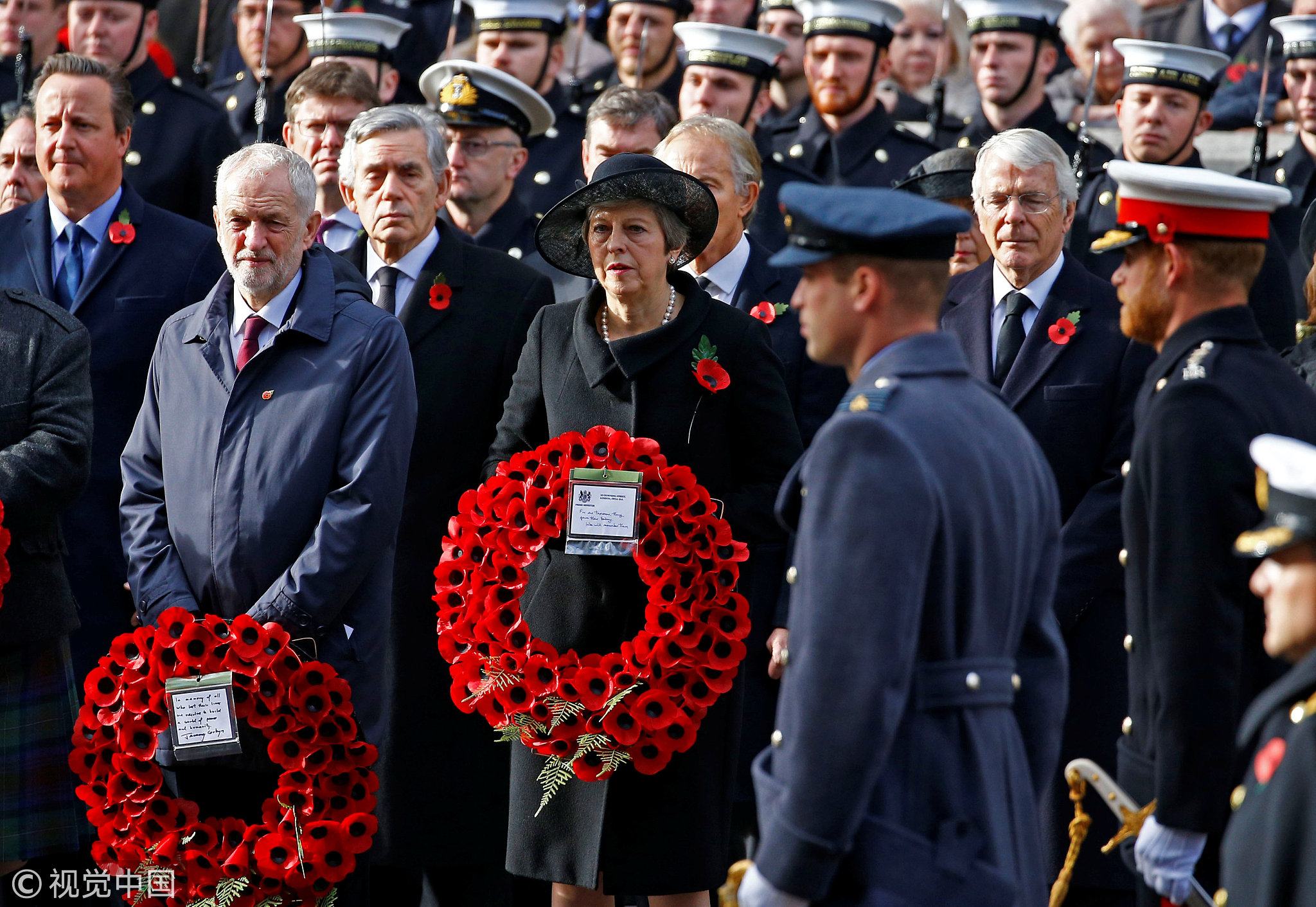
Britain's Prime Minister Theresa May looks on as Prince William and Prince Harry pay their respects during a National Service of Remembrance at The Cenotaph in London, Britain, November 11, 2018. /VCG Photo
Britain's Prime Minister Theresa May looks on as Prince William and Prince Harry pay their respects during a National Service of Remembrance at The Cenotaph in London, Britain, November 11, 2018. /VCG Photo
Across France, Belgium, Britain, Canada, Australia, and New Zealand, as well as in parts of Germany and the US, bells tolled on Sunday in a repeat of the outpouring of joy and relief that greeted the news that the war was over 100 years ago.
Light installations at the Sydney Opera House, the Tower of London and the National WWI Museum in Kansas City, US, also honored the anniversary.
Honoring the war dead
Kicking off a weekend of commemorations, Macron and Merkel already traveled on Saturday to the forest of Compiegne northeast of Paris where the armistice ending the war was signed on November 11, 1918 and unveiled a plaque reaffirming "the value of Franco-German reconciliation."
The ceremony was highly symbolic, being the first time in 78 years that French and German leaders came together at the historic site. The last time was in 1940, when as payback for World War One, Adolf Hitler forced French leaders to sign their surrender at the exact same spot where Germany capitulated in 1918.
In the run-up to Sunday, European leaders were also busy touring battlefields and World War One memorial sites.
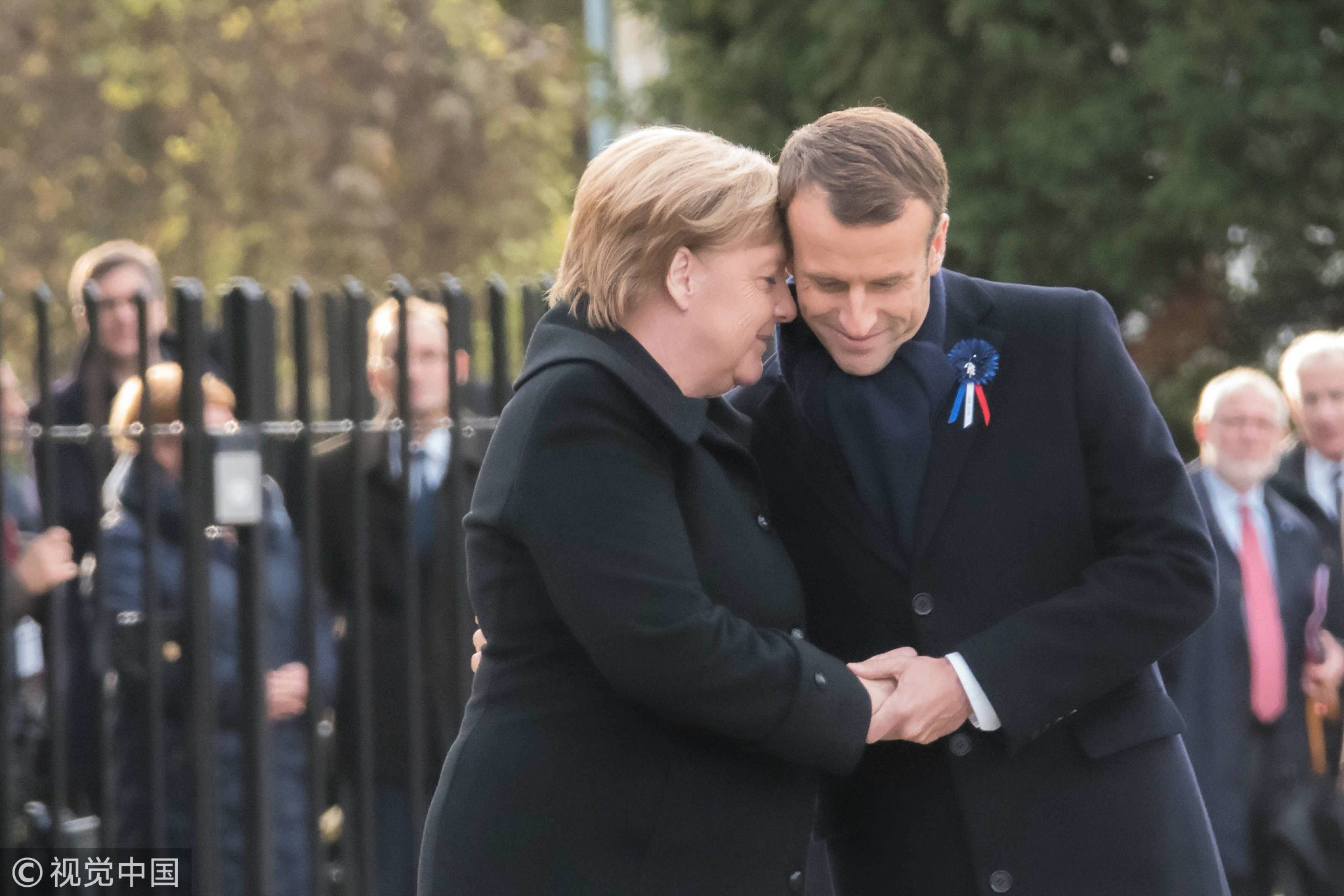
German Chancellor Angela Merkel and French President Emmanuel Macron hold hands during a ceremony commemorating the end of World War I at the forest of Compiegne, France, November 10, 2018. /VCG Photo
German Chancellor Angela Merkel and French President Emmanuel Macron hold hands during a ceremony commemorating the end of World War I at the forest of Compiegne, France, November 10, 2018. /VCG Photo
Macron visited the sites of some of the deadliest battles in northeastern France. May joined him to pay tribute to soldiers killed in the Battle of the Somme and traveled to Belgium to honor British war dead with Belgian Prime Minister Charles Michel.
Trudeau on Saturday remembered Canadian troops killed in World War One at his country's Vimy Ridge War Memorial near Arras.
Trump on the other hand drew ire for skipping a visit on Saturday to a US military cemetery in Belleau, citing bad weather. Critics slammed his move on social media, calling it disrespectful to veterans. White House Chief of Staff John Kelly and General Joseph Dunford, Chairman of the Joint Chiefs of Staff, went instead and Trump was due to visit a US cemetery in Suresnes on the outskirts of Paris on Sunday.
Overseas commemorations
World War One engulfed not only Europe but drew in countries from as far as the US, Australia and New Zealand, and on Sunday they too commemorated the end of the horrific war.
New Zealand held two minutes of silence at 11 a.m. and a 100-gun salute was fired in Wellington. In a speech at the National War Memorial, Prime Minister Jacinda Ardern urged to "never forget the service and sacrifice our forebears made."

Twitter screenshot. /CGTN
Twitter screenshot. /CGTN
A national ceremony was also held in Canberra where Australian Prime Minister Scott Morrison paid tribute to the sacrifices of thousands of Australian troops during World War One.
Some 400,000 ANZAC troops served overseas during the war and about 80,000 were killed. The 1915 Battle of Gallipoli on the Turkish peninsula is still remembered for the heavy losses incurred by Australian and New Zealand Army Corps.
In the US, the National Cathedral in Washington, DC was to hold a service at 11 a.m. local time to remember the 4.7 million Americans who served and 100,000 who were killed in World War One.
Indian Prime Minister Narendra Modi, in a series of tweets, also made a call to end war and remembered the Indian soldiers who "fought the world over, just for the cause of peace."
In all, some 10 million soldiers were killed over four years of brutal fighting, with Russia, Germany, France, Austria-Hungary, Britain, Italy and the Ottoman Empire suffering the biggest casualties. At least 20 million more returned from the front wounded, maimed or traumatized for life.
(Top picture: Heads of state and government attend a ceremony commemorating the end of World War I at the Arc de Triomphe in Paris, France, November 11, 2018. /VCG Photo)

